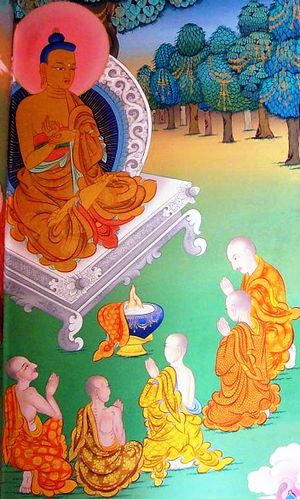Four Noble Truths: Difference between revisions
m (→External Links) |
m (→Notes) |
||
| Line 19: | Line 19: | ||
==Notes== | ==Notes== | ||
<References /> | <small><References/></small> | ||
==External Links== | ==External Links== | ||
Revision as of 19:56, 12 January 2013

The Four Noble Truths (Skt. catvāryāryasatyā; Tib. འཕགས་པའི་བདེན་པ་བཞི་, pakpé denpa shyi; Wyl. 'phags pa'i bden pa bzhi) or the Four Realities of the Aryas, were taught by Buddha Shakyamuni as the central theme of the so-called first turning of the wheel of the Dharma after his attainment of enlightenment. They are:
- the truth (or reality) of suffering (Tib. སྡུག་བསྔལ་གྱི་བདེན་པ་, Skt. duḥkha-satya) which is to be understood,
- the truth (or reality) of the origin of suffering (Tib. ཀུན་འབྱུང་བའི་བདེན་པ་, Skt. samudaya-satya), which is to be abandoned,
- the truth (or reality) of cessation (Tib. འགོག་པའི་བདེན་པ་, Skt. nirodha-satya), which is to be actualized, and
- the truth (or reality) of the path (Tib. ལམ་གྱི་བདེན་པ་, Skt. mārga-satya), which is to be relied upon.[1]
Cause & Effect
The four truths can be divided into two pairs of cause and effect, known as the cause and effect of 'thorough affliction' (Skt. saṃkliṣṭa; Tib. ཀུན་ཉོན་, Wyl. kun nyon) or samsara, and the cause and effect of 'complete purification' (Skt. vyavadāna; Tib. རྣམ་བྱང་, Wyl. rnam byang) or nirvana.
Sixteen Aspects of the Four Noble Truths
Suffering
1. Suffering (Skt. duḥkha; Tib. སྡུག་བསྔལ་བ་)
2. Impermanence (Skt. anitya; Tib. མི་རྟག་པ་)
3. Emptiness (Skt. śūnyatā; Tib. སྟོང་པ་ཉིད་)
4. Selflessness (Skt. anātmaka; Tib. བདག་མེད་པ་)
Origination
5. Cause (Skt. hetu; Tib. རྒྱུ་)
6. Origination (Skt.samudaya; Tib. ཀུན་འབྱུང་)
7. Intense Arising (Skt. prabhava; Tib. རབ་སྐྱེ་)
8. Condition (Skt. pratyaya; Tib. རྐྱེན་)
Cessation
9. Peace (Skt. śānta; Tib. ཞི་བ་)
10. Cessation (Skt. nirodha; Tib. འགོག་པ་)
11. Perfection (Skt. praṇīta; Tib. གྱ་ནོམ་པ་)
12. True Deliverance (Skt. niḥsaraṇa; Tib. ངེས་འབྱུང་, Wyl. nges 'byung)
Path
13. Path (Skt. mārga; Tib. ལམ་)
14. Appropriate (Skt. nyāya; Tib. རིགས་པ་)
15. Effective (Skt. pratipatti; Tib. སྒྲུབ་པ་)
16. Truly Delivering (Skt. nairyāṇika; Tib. ངེས་འབྱིན་)
Further Reading
- Jamgön Mipham Rinpoche, Gateway to Knowledge, VOL II (Hong Kong, Boudhanath & Esby: Rangjung Yeshe Publications, 2000).
- Kangyur Rinpoche, Treasury of Precious Qualities (Boston & London: Shambhala, 2001), pages 67-84 & 'Appendix 3'.
- Ringu Tulku, Daring Steps Towards Fearlessness: The Three Vehicles of Buddhism, Snow Lion, 2005
- Appendix 2, pp.167-168 in The Light of Wisdom Volume 1. Root text by Padmasambhava and commentary by Jamgön Kongtrül the Great. Published by Shambhala Publications ISBN 0-87773-566-2
Notes
- ↑ ནད་ནི་ཤེས་བྱ་ནད་ཀྱི་རྒྱུ་ནི་སྤང་བྱ་ལ། །
བདེ་གནས་ཐོབ་བྱ་སྨན་ནི་བསྟེན་པར་བྱ་བ་ལྟར། །
ཤེས་བྱ་སྤང་བྱ་རིག་པར་བྱ་ཞིང་བསྟེན་པར་བྱ། །
སྡུག་བསྔལ་རྒྱུ་དང་དེ་འགོག་པ་དང་དེ་བཞིན་ལམ། །
Illness must be understood, its causes eliminated,
Wellbeing must be attained, and medicine taken.
Likewise, suffering, its causes, their cessation and the path
Must in turn be understood, eliminated, realized and relied upon.
- Maitreya, Sublime Continuum, IV, 55